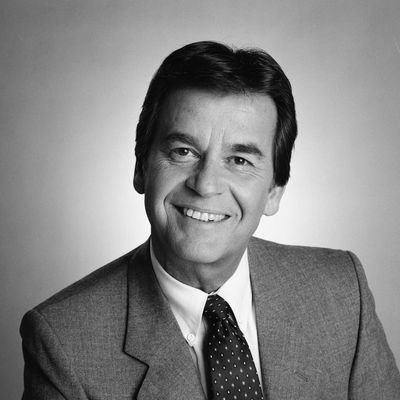
Dick Clark died this morning after 82 years of life and about 60 years in show business. The last 30 were marked by affectionate jokes that he looked fantastic for his age and would probably live forever. Eventually the record stopped, as it must for everyone, but Clark’s title as “America’s Oldest Teenager” seems likely to stand unchallenged. “I’ve been watching Dick Clark ever since I was a little kid,” said vaudevillian George Burns, who was born 34 years before Clark.
During the early peak of his career, Clark hosted American Bandstand, the show that helped rock and roll go mainstream. The program began its 37-year run in 1952 as “Dick Clark’s Caravan of Music,” airing on Philadelphia’s WFIL, an ABC affiliate. In 1957, it moved up to the network. Under the command of Clark, who served as guiding producer as well as host, the series didn’t just carve out a permanent place for modern popular music on TV; it served as an outpost for cultural integration, mixing white and black pop acts in its lineup.
The onscreen teenage “audience” of dancers stayed predominantly white until the early sixties, though, mixing only after organized protests; there was no official policy of segregation, but the network’s producers made it hard for black teens to get through the door of the show’s onscreen “dance party.” Still, Clark’s democratic attitude toward his musical acts was an important statement in itself. He later said that singer Sam Cooke opened his eyes to the bigotry that African-Americans faced in mid-century America. “You knew that people of color faced prejudice every day of their lives,” Clark wrote in a 1997 news article, “but Sam was the first person to tell me about it in personal terms.” The NBC series American Dreams, which featured a racially mixed ensemble cast and was co-produced by Clark himself, begins in 1963, five years after Bandstand’s move to the network, with the first black dancer being admitted to the floor. The various versions of John Waters’s Hairspray offered a fictionalized, comic take on the same subject.
As long as it had a good beat and you could dance to it, a song was potential Bandstand material. Bill Haley and the Comets, Little Richard, Elvis Presley, Chubby Checker, Jerry Lee Lewis, Fats Domino, Etta James, the Mamas and the Papas, the Jacksons, Gladys Knight and the Pips, Chaka Khan, ABBA, Prince, Kool and the Gang, Bryan Adams, Madonna: If an act was musically and/or commercially significant, there was an excellent chance it was introduced to a wide audience by Clark, whose polished but never cloying screen presence went down like a malted milkshake.
The host remained so young-looking throughout the seventies and eighties that there were rumors of extensive plastic surgery (which he denied) as well as jokes about wizened portraits stored in a dark closet somewhere. Comedian Bill Hicks said Clark’s agelessness proved that he was the antichrist. Clark played up this running pop culture gag in cameos as himself. One of the most memorable was in the Police Squad! episode “Testimony of Evil (Dead Men Don’t Laugh),” which finds Clark buying black-market “Secret Formula Youth Cream.”
As a producer, Clark was a powerful behind-the-scenes force in the entertainment industry. There was a time when it seemed that every hit game show and a lot of other programs were produced by Clark’s company: So You Think You Can Dance, $25,000 Pyramid, TV’s Bloopers & Practical Jokes, American Music Awards, and many others. (According to one estimate, the company produced 7,500 hours of television.) “A producer is a garbage collector,” Clark told CNN in 2004. “You collect all of it, and you sort it out, and if you can get away from it, then it doesn’t leave a lot of odor, you get all the glory. And if it smells bad, you get all the blame.”
Clark’s seemingly unstoppable momentum was temporarily interrupted in 2004, when he suffered a stroke. But a year later, he returned to TV, his speech and motion somewhat halting, and did his thing on one of his most iconic shows, New Year’s Rockin’ Eve, a live special that has been broadcast every year since it first aired on December 31, 1972. But it is Bandstand that will be remembered as his greatest legacy. “Think about what happened there,” Clark said in 1994, accepting a Lifetime Achievement Emmy. “Kids got together in a social atmosphere, they got to know one another, they exchanged cultures. They didn’t hurt each other. There wasn’t any violence. We could all learn something from that show.”





